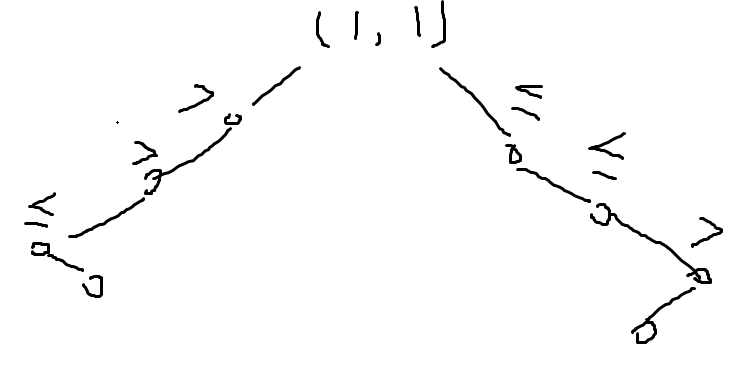对于一个节点,应该记录两个二元组(A(x0,y0))和(B(x1,y1)),这个点的实际值是(C=frac{x0+x1}{y0+y1})。
当这个点的值(le 需要的值),则下一步应该往右走,否则往左走。

每次走的时候二分一个最远的步数满足和原来的$le (状态相同,将其赋为新的)A(或)B$,这样再走一步就状态切换了。
若一开始(le),则二分完后新的(A)还是(le 需要的值),用它更新答案。
可以适当的封装函数(比如二分上界、判断大小)以简化代码。
Code:
#include<bits/stdc++.h>
#define fo(i, x, y) for(int i = x, _b = y; i <= _b; i ++)
#define ff(i, x, y) for(int i = x, _b = y; i < _b; i ++)
#define fd(i, x, y) for(int i = x, _b = y; i >= _b; i --)
#define ll long long
#define pp printf
#define hh pp("
")
using namespace std;
struct P {
ll x, y;
P(ll _x = 0, ll _y = 0) {
x = _x, y = _y;
}
};
const ll lim = 1e10;
#define db double
const db w = 5.2312312;
int chk(P a) {
return a.x <= w * a.y;
}
ll get_mx(P a, P b) {
ll s = lim;
if(b.x) s = min(s, (lim - a.x) / b.x);
if(b.y) s = min(s, (lim - a.y) / b.y);
return s;
}
int main() {
P a = P(0, 1), b = P(1, 0);
P ans;
while(1) {
P c = P(a.x + b.x, a.y + b.y);
if(c.x > lim || c.y > lim) break;
if(chk(c)) {
a = c;
for(ll l = 1, r = get_mx(c, b); l <= r; ) {
ll m = l + r >> 1;
P d = P(c.x + b.x * m, c.y + b.y * m);
if(chk(d)) a = d, l = m + 1; else r = m - 1;
}
ans = a;
} else {
b = c;
for(ll l = 1, r = get_mx(c, a); l <= r; ) {
ll m = l + r >> 1;
P d = P(c.x + a.x * m, c.y + a.y * m);
if(!chk(d)) b = d, l = m + 1; else r = m - 1;
}
}
}
pp("%lld %lld
", ans.x, ans.y);
pp("%.20lf
", (db) ans.x / ans.y);
}